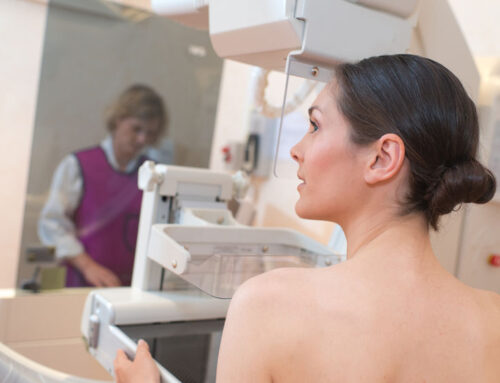Routine Mammograms Save Lives
When caught early, breast cancer is very treatable. Women aged 40 and older are encouraged to get mammograms to screen for early signs of cancer. Mammograms can also be used as diagnostic tools when unusual symptoms or findings present. Although the preventative practice is highly encouraged for older women, do individuals under age 40 also need mammograms?

What is a mammogram?
Women scheduling a mammogram for the first time may wonder what to expect. Essentially, a mammogram is an x-ray of the breast that can detect cancer before apparent symptoms, such as a lump, appear. During the procedure, the breasts are placed on a plastic plate and flattened while the image is taken. Women may feel slight pressure during the mammogram, but the procedure only takes a few minutes. A radiologist then examines the images and calls the patient with any concerning results within 2 weeks.
When to start
Current recommendations state that women should start getting mammograms at age 40. The age range was recently lowered in an attempt to catch more cases of breast cancer sooner. Although research supports the recommendation to start screening at age 40, some women may need to schedule a mammogram even earlier.
Family history
If a woman has an immediate family member, such as a sibling, parent, or child, with breast cancer, individual risk for the disease is higher. Women in this category may benefit from earlier screening and should discuss the pros and cons of mammograms before age 40 with a healthcare provider. Individuals with the breast cancer gene known as BRCA1 or BRCA2 would also qualify for breast screenings at a younger age.
Race and ethnicity
Breast cancer risk can vary by race and ethnicity. Although incidence rates of the disease are similar among Black and White women, Black women have a 40% higher death rate from breast cancer. Various social, economic, and behavioral factors can explain this increase. Black women are more likely to have health conditions like heart disease and diabetes and are more likely not to breastfeed, both of which can increase the risk of breast cancer. Additionally, Black women may be less likely to have health insurance or access to healthcare facilities. For these reasons, earlier screening may be necessary to catch cancer sooner.
Dense breasts
Women with dense breast tissue are more likely to experience breast cancer, with the risk increasing by 25% or more. The denser the breast, the higher the risk. In some situations, the doctor may recommend an earlier mammogram if dense breasts are identified during a routine annual examination or the woman voices concerns.
Screening decreases risk
To successfully treat breast cancer, early diagnosis is critical. Women over 40, individuals with a family history of breast cancer, Black women, and people with dense breasts should get a mammogram. This screening tool is quick, relatively painless, and can save lives.




